AvPD Recovery: Self-esteem.
AvPD recovery: Self-esteem.
(Part of my ongoing series of posts on Avoidant Personality Disorder.)
AvPD isolates you from being truly connected, being part of the world.
It keeps you from creating trust-filled, satisfying relationships.
It also keeps you from connecting with yourself, like I wrote about in another post.
It keeps you from truly feeling -- and even sometimes recognizing -- your own emotions, your own wishes.
Most of all, being this way hurts.
Avoiding our feelings and being detached from ourselves is not normal.
And just like the pain of a physical injury, this pain is a reaction that comes from seeking wholeness. It’s calling attention to a real problem.
It’s okay to try and fix the problem.
It’s okay to pay attention to how you feel.
Even if it’s negative.
Yes! Even if it’s absolutely terrible.
Ignoring bad feelings is sometimes necessary for survival. And if it is for you right now, you probably already know it. That’s okay, and you can probably still do a lot of these things.
Remember: There’s no right or wrong way to heal.
Find a place where you can be absolutely alone, on purpose.
A place where there isn’t anyone who will judge you or make fun of you -- a place just for you, like a private journal or sketchbook or blog. Even the best option will probably feel kind of uncomfortable, so don’t obsess over finding the perfect outlet for this!
Do whatever you can to make it feel safe and out of reach from everyone.
And then spend time there, regularly.
Once you get used to it, try noticing what it’s like to not have anybody looking over your shoulder.
Can you even imagine it? It’s a terrible contradiction that we spend so much time alone, but so little time feeling un-watched. Free of observers and judging eyes.
See if you can get to know your feelings.
Within the protection of your solitude, try writing about your feelings. Or drawing or singing or collaging about them -- whatever works for you.
It doesn’t have to be pretty, and it’s okay if it doesn’t feel natural. It’s a skill, and you have to gain proficiency just like with any other skill. You'll get there; it doesn’t matter how slow or fast that happens.
As long as you’re trying, you’re making progress.
If you learn one tiny thing about yourself, or if you get a little more used to expressing yourself -- then it’s a success.
Experiment with being nice to yourself sometimes.
This is so, so hard, and it’s okay if you’re not ready to try.
But when you are, just try being kind to yourself. Try being gentle. Give yourself the benefit of the doubt once in a while.
And if you can’t do it, try not to hate yourself too much for failing. It’s OK -- if "official permission” existed, this would be it: You don’t have to punish yourself.
Do things that feel good.
Just because they feel good. It’s OK to do that.
In particular, look for things that just sound like they would be nice, right about now. Something that you just ... feel like doing.
Even if it’s only a tiny thing, like making yourself a cup of tea, or taking a nice bath, or re-reading your favorite book.
Learn what it feels like to want something, and learn what it’s like to give yourself something good.
Try to consciously look for “wins.”
After doing anything, if you find yourself retracing your mistakes, blaming yourself, or feeling sick and anxious and guilty -- take a minute to redirect your thoughts.
Ask yourself: what went right? In what ways did I succeed?
It doesn’t matter if your brain is throwing lots of fails and embarrassment at you; that’s like a TV channel that never turns off. You don’t have to pay attention to it all the time. Just, when you have the energy to, deliberately focus on the good anyway.
The smallest success still counts: “Hey, I remembered what building my class is in! I was basically on time! I didn’t trip over anyone! I learned something!” Even if you have to name truly silly things for “wins,” start with those.
The point is giving yourself credit, instead of bringing yourself down.
And you might be surprised at how well things actually went -- when you start looking at how well they went, instead of how badly.
These things are the heart of recovering from AvPD...
...in my opinion, and in my own experience. Because this is how you recover your self-esteem.
The simple way to see AvPD is that other people judge and hurt us.
But the more complex truth is that their judgment only has the power to affect us that much, because we’ve never claimed the right to judge for OURSELVES.
We never learned to like ourselves, or to be kind to ourselves. We never learned to take care of ourselves. To own who we are, as human beings. To decide OUR OWN value.
That takes some intense courage. But you don’t have to do it all at once.
Every single thing I listed here is about:
reclaiming your inner life for yourself,
finding your feelings and wishes again,
practicing taking care of your feelings.
Taking care of yourself means healing shame. It means giving yourself value.
We all need to be validated, listened to, cared for, and given positive value. We need dignity.
But when you can give those things to yourself in abundance, you don’t have to rely on other people’s scraps for your self-esteem.
And that’s how you get free. The fear will still be there. But it won’t control you.
More Posts from Zella-rose and Others
It doesn’t make you unlovable or a horrible person if you don’t have many friends. It can be difficult to meet new people if you’re shy or quiet or have anxiety. It can be difficult to stay in touch with people if you can’t find the time or energy to remain in contact. It can be difficult to make new friends if you struggle to find people you click with or who are interested in the same things as you. None of those things mean you’re unlovable.
Hm... I definitely have some dependent traits. But some borderline traits, too, and a few NPD.
(I have a theory that AvPD, BPD and NPD are different expressions of the same core issue. They all circle around a very particular kind of shame, which is why we can all learn a lot from each other. I’ll have to do more research before I can figure out if DPD fits the same pattern though)
I believe I have both avpd and dpd, but it's kind of confusing for me. Do you think that's possible, and if so how do you think a person with both would behave (for comparison to myself)?
I think DPD is confusing for a lot of people, so don’t worry, you’re not alone in that. But AvPD and DPD is actually a really common co-morbidity, as you can see by the data at this link: here. (Beware of Out of the FOG in general, but it’s the only site that has statistical data on these things.) Plus, PDs are most co-morbid with other ones in the same cluster.
Someone with both AvPD and DPD would probably have a pronounced relationship with a “safe person”, I imagine. Who in this case would also be what I think the majority of the DPD community refers to as their “depended”. But while most people with DPD seek validation and dependence from many people, and rely on the opinions of others for whatever they do, I think people with AvPD as well would mainly focus on the one person, and be terrified of engaging with others, even if they wanted to.
But experiences will vary, as they always do. There are a myriad of experiences for any disorder, so matter what the clinical expectation is. Some people suffer from some symptoms more than others.
I hope that helps!
- Shinji
Any advice on how to approach tough conversations with my parents without getting overwhelmed and crying?
-Keep in mind that not every discussion is a fight. It doesn’t have to turn into a fight.
-Think about what you want to say on beforehand. You can write your ideas if possible so you don’t miss any point or get lost within the conversation.
-Tell your parents that you want to talk about something important. Schedule a brief time with them in which they can give you their attention.
-Let them know why talking about that subject is important for you.
-Your emotional well being goes first. If the thing is getting ugly you can ask to pause the conversation and re take it when everybody is more calm (this particular tip has made wonders in the relationship with my mom).
-Keep your voicetone calm but steady. Don’t shout, and try to not get heated. Remember that it’s a conversation. Don’t get defensive even if they do. The outcome might not be what you wanted and that might be frustrating but try to stay calm.
-Some phrases that might help are:
“I would like to know what you think of (the subject)”
“Why do you think that way? What are your concerns?”
“I understand why you say it but I do not agree”
“From my point of view…”
“I would appreciate if you could give thought to (subject)” and negotiate a partial agreement
“I don’t agree with that but I respect your decision/ will support you”
-If things don’t go your way you can always try again when armed with resources.
And even if the outcome isn’t what you wanted I am already proud of you for speaking out. I believe you and support you.
AvPD theory: social dysregulation
Part of Avoidant Personality Disorder is like … a failure to regulate social experiences. Like we don’t properly integrate or process what we feel.
Interacting with someone means feeling visible, connected, and like you are a self-among-selves: you’re existing as a person, in the presence of others.
Most folks, of course, can handle that effortlessly. They even seek it out.
People need social ‘background noise’ and social stimulation.
They reach out easily and often, just because it feels good to them.
Socializing gives them a sense of comfortable connectedness. And relief from isolation – they don’t “exist in a vacuum.”
It helps smooth out their inner experiences, thoughts and feelings.
But with AvPD, I don’t think we process social input normally.
The sensations of interacting don’t feel like how most people feel them. Being visible, connected, a person – it just seems dangerous and harsh.
And we can’t put these feelings into context.
We can’t step back from them, or control how much they affect us.
We don’t have the ability to regulate what we’re experiencing.
That means nearly all social stimuli are negative to us, whether friend or foe. Being-in-contact-with-people is all it takes to distress us.
It’s overwhelming and de-stabilizing.
It provokes more big feelings, and reactions we don’t feel safe facing.
Our inner experience is turned into chaos.
We’re left feeling helpless, afraid, inexplicably ashamed.
We want positive connection. But we usually end up with painful chaos instead.
And it’s a thousand times worse if you’re having an actually negative encounter, like facing someone who’s angry or criticizing you.
Social perfectionism is about trying to escape this:
“I might be able to enjoy this thing… but only if nothing goes wrong ever.”
Perfectionism is a great misdirect. Because “every possible problem” is not the issue that needs solving.
What we need to do, is learn how to experience social input in a positive way. And un-learn all the bad habits that have grown instead.
(more here!)
AvPD and healing self-esteem - tl;dr.
(Part of my ongoing series of posts on Avoidant Personality Disorder.)
AvPD disconnects you from others, from yourself, and from your feelings.
And that hurts. A lot.
It’s okay to try and fix it.
It’s okay to want to feel better.
And it’s okay to notice your feelings, even if they’re unpleasant.
When you feel judged on all sides, make a safe space for yourself. Find somewhere you can be totally alone and free of observation, like a private journal. Feel what it’s like to not have anyone looking over your shoulder -- maybe for the first time.
Explore your feelings. Get to know what you really think and want, when your opinion is the only one that matters.
When you can, be nice to yourself. Try giving yourself the benefit of the doubt.
Do things that feel good.
When you’re upset with yourself for messing up, consciously decide to look for things that you succeeded at instead. Make a list of wins.
Here’s how this relates to self-esteem.
When we describe what it feels like to have AvPD, it sounds like, “Everyone judges and hurts me.”
But people only have the power to decide how much we’re worth, because we aren’t taking charge of doing that ourselves.
When you reconnect with your feelings, create a judgment-free zone for yourself, and learn to treat yourself nicely, you’re giving value to yourself. You’re saying, “This matters. My feelings matter. I’m worth taking care of.”
Esteem means “favorable opinion or respect.” In the throes of AvPD, we survive on other people’s esteem for us -- it matters what they think, because that’s how we determine our self-worth. But when we shift to relying on self esteem, we can finally heal and begin to thrive.
When we give respect and value to ourselves, no one else can take it away.
And that’s why practicing self-care and self-kindness is so powerful and important.
(You can read more here, in the long version of this post.)


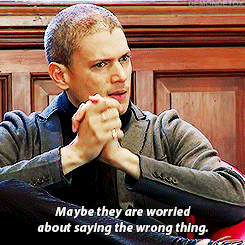
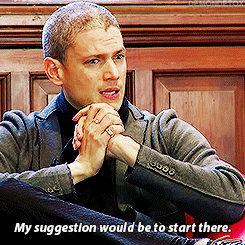
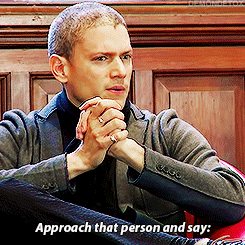

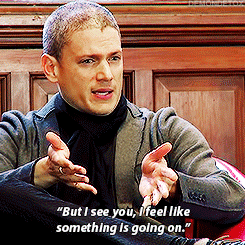
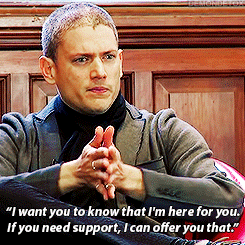
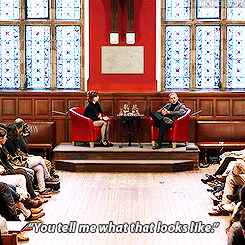
“In that way, you’ve acknowledged that you’re unsure, that you don’t know what to do or say. You’ve acknowledged that you see them. They feel seen. They feel heard and acknowledged, which is huge for someone who’s in crisis.” Wentworth Miller | Q&A at Oxford Union | 2016 | x

Understanding the stages of grief is a start. But whenever I talk about the stages of grief, I have to remind people that the stages aren’t linear and may not happen in this order. It’s not a map but it provides some scaffolding for this unknown world.
Grief counseling is something I have found hugely beneficial for dealing with the inconsistencies and unpredictability of living with multiple chronic illnesses. It was suggested to me by my therapist, who realized that my rapid cycling emotions weren’t just due to the ADHD, but because I was also constantly in a state of perpetual grieving; grieving for my past self who suffered and endured, for my current self still going through it, and for my future self, and a future that will forever be steeped in uncertainty.
I will always be in a state of grieving, because the stages of grief are not linear, and even after you reach the stage of acceptance, you will always carry some shard of the experience with you. In my case it’s less a shard, and more my entire existence. I live in a perpetual state of open-ended uncertainty.
And now, so does everyone else.
You are grieving, both for the things going on right now, and the things we anticipate that will happen as a result. You are grieving, and that’s okay, you need to experience these emotions and process them. You are not being irrational, you are not being weak. You are being human.
Be kind to yourselves. This will pass. It will pass like the kidney stone of an angry god pissing vengeance into the wind. But it will pass.
Try stuff. Put plants in your room even if you aren’t the best at caring for them. Attempt that dessert recipe even if it turns out ugly. Listen to that music you’ve been meaning to try for a while. The world is full of infinite sources of goodness and the best thing to do it to try and find as many as possible.
-
 brainnotesdotjpg reblogged this · 4 months ago
brainnotesdotjpg reblogged this · 4 months ago -
 woobifiedvillain liked this · 4 months ago
woobifiedvillain liked this · 4 months ago -
 ghostofavictorianbastard liked this · 7 months ago
ghostofavictorianbastard liked this · 7 months ago -
 heavenschild666 reblogged this · 10 months ago
heavenschild666 reblogged this · 10 months ago -
 heavenschild666 liked this · 10 months ago
heavenschild666 liked this · 10 months ago -
 littlemeowmeowmaeve reblogged this · 1 year ago
littlemeowmeowmaeve reblogged this · 1 year ago -
 littlemeowmeowmaeve liked this · 1 year ago
littlemeowmeowmaeve liked this · 1 year ago -
 c0rvicide reblogged this · 1 year ago
c0rvicide reblogged this · 1 year ago -
 vegetalfeline liked this · 2 years ago
vegetalfeline liked this · 2 years ago -
 kalopsiavian liked this · 2 years ago
kalopsiavian liked this · 2 years ago -
 neuro-typical liked this · 2 years ago
neuro-typical liked this · 2 years ago -
 thesehollow-bones reblogged this · 2 years ago
thesehollow-bones reblogged this · 2 years ago -
 hauntedselves reblogged this · 2 years ago
hauntedselves reblogged this · 2 years ago -
 strawburrieslushie liked this · 2 years ago
strawburrieslushie liked this · 2 years ago -
 ips-n-caliban liked this · 2 years ago
ips-n-caliban liked this · 2 years ago -
 apricitysstuff liked this · 2 years ago
apricitysstuff liked this · 2 years ago -
 one-good-day reblogged this · 5 years ago
one-good-day reblogged this · 5 years ago -
 dragonshine liked this · 5 years ago
dragonshine liked this · 5 years ago -
 perihel1on reblogged this · 6 years ago
perihel1on reblogged this · 6 years ago -
 scythe-wolf reblogged this · 6 years ago
scythe-wolf reblogged this · 6 years ago -
 brunettedog liked this · 6 years ago
brunettedog liked this · 6 years ago -
 stormskies reblogged this · 6 years ago
stormskies reblogged this · 6 years ago -
 light-of-being liked this · 6 years ago
light-of-being liked this · 6 years ago -
 hey-bug liked this · 7 years ago
hey-bug liked this · 7 years ago -
 ss252-blog liked this · 7 years ago
ss252-blog liked this · 7 years ago -
 aterminalcase liked this · 7 years ago
aterminalcase liked this · 7 years ago -
 nvtsumi liked this · 7 years ago
nvtsumi liked this · 7 years ago -
 deviantmel reblogged this · 7 years ago
deviantmel reblogged this · 7 years ago -
 apparently-adhd reblogged this · 7 years ago
apparently-adhd reblogged this · 7 years ago -
 moniblues liked this · 8 years ago
moniblues liked this · 8 years ago -
 sigynbrynhildr liked this · 8 years ago
sigynbrynhildr liked this · 8 years ago -
 f3e2f1 liked this · 8 years ago
f3e2f1 liked this · 8 years ago -
 prospitfox liked this · 8 years ago
prospitfox liked this · 8 years ago -
 softlyavoid reblogged this · 8 years ago
softlyavoid reblogged this · 8 years ago -
 lovelunaluxe666 liked this · 8 years ago
lovelunaluxe666 liked this · 8 years ago -
 stargazihng liked this · 9 years ago
stargazihng liked this · 9 years ago -
 helenellen liked this · 9 years ago
helenellen liked this · 9 years ago -
 darklordreasonable reblogged this · 9 years ago
darklordreasonable reblogged this · 9 years ago






